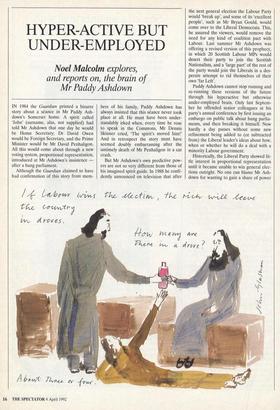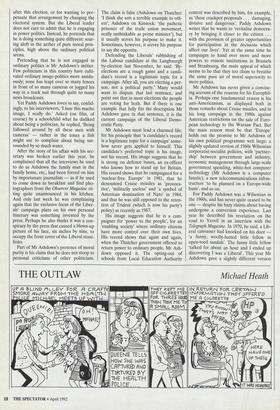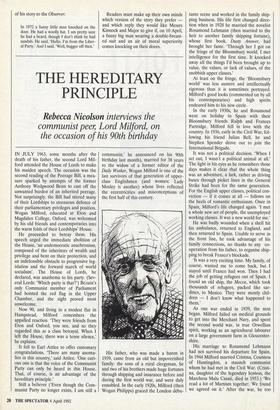HYPER-ACTIVE BUT UNDER-EMPLOYED
Noel Malcolm explores,
and reports on, the brain of Mr Paddy Ashdown
IN 1984 the Guardian printed a bizarre story about a séance in Mr Paddy Ash- down's Somerset home. A spirit called `John' (surname, alas, not supplied) had told Mr Ashdown that one day he would be Home Secretary; Dr David Owen would be Foreign Secretary, and the Prime Minister would be Mr David Penhaligon. All this would come about through a new voting system, proportional representation, introduced at Mr Ashdown's insistence after a hung parliament.
Although the Guardian claimed to have had confirmation of this story from mem-
bers of his family, Paddy Ashdown has always insisted that this séance never took place at all. He must have been under- standably irked when, every time he rose to speak in the Commons, Mr Dennis Skinner cried, The spirit's moved him!' And in retrospect the story must have seemed doubly embarrassing after the untimely death of Mr Penhaligon in a car crash.
But Mr Ashdown's own predictive pow- ers are not so very different from those of his imagined spirit guide. In 1988 he confi- dently announced on television that after the next general election the Labour Party would 'break up', and some of its 'excellent people', such as Mr Bryan Gould, would come over to the Liberal Democrats. This, he assured the viewers, would remove the need for any kind of coalition pact with Labour. Last summer Mr Ashdown was offering a revised version of this prophecy, in which 20 Scottish Labour MPs would desert their party to join the Scottish Nationalists, and a 'large part' of the rest of the party would join the Liberals in a des- perate attempt to rid themselves of their own 'far Left'.
Paddy Ashdown cannot stop running and re-running these versions of the future through his hyperactive but otherwise under-employed brain. Only last Septem- ber he offended senior colleagues at his party's annual conference by first issuing an embargo on public talk about hung parlia- ments, and then breaking it himself. Now hardly a day passes without some new refinement being added to (or subtracted from) the Liberal leader's ideas about how, when or whether he will do a deal with a minority Labour government.
Historically, the Liberal Party showed lit- tle interest in proportional representation until it became unable to win general elec- tions outright. No one can blame Mr Ash- down for wanting to gain a share of power after this election, or for wanting to per- petuate that arrangement by changing the electoral system. But the Liberal leader does not care to admit that he is engaging in power politics. Instead, he pretends that he is doing something quite different: soar- ing aloft in the aether of pure moral prin- ciples, high above the ordinary political arena.
Pretending that he is not engaged in ordinary politics is Mr Ashdown's metier. Few politicians in this country have culti- vated ordinary image-politics more assidu- ously; none has leapt over so many fences in front of so many cameras or jogged his way in a track suit through quite so many news broadcasts.
Yet Paddy Ashdown loves to say, confid- ingly, to his interviewers, 'I hate this macho image, I really do.' Asked (on film, of course) by a schoolchild what he disliked about being a politician, he replied, 'Being followed around by all these men with cameras' — rather in the tones a fish might use to complain about being sur- rounded by so much water.
After the story of his affair with his sec- retary was broken earlier this year, he complained that all the interviews he used to do as Ashdown the family man in the family home, etc., had been forced on him by importunate journalists — as if he used to come down to breakfast and find pho- tographers from the Observer Magazine sit- ting quite unannounced in his kitchen. And only last week he was complaining again that the exclusive focus of the Liber- als' campaign plans on his own personal itinerary was something invented by the press. Perhaps he also thinks it was a con- spiracy by the press that caused a blown-up picture of his face, six inches by nine, to occupy the front cover of the Liberal mani- festo.
Part of Mr Ashdown's pretence of moral purity is his claim that he does not stoop to personal criticisms of other politicians. The claim is false (Ashdown on Thatcher: 'I think she sets a terrible example to oth- ers'; Ashdown on Kinnock: 'the pathetic prisoner of the trade union movement, really unthinkable as prime minister'), but it usually serves his purpose to make it. Sometimes, however, it serves his purpose to say the opposite.
Defending the Liberals' rubbishing of the Labour candidate at the Langbaurgh by-election last November, he said: 'By- elections are a rough game and a candi- date's record is a legitimate topic for a campaign. After all, you are electing a per- son, not a political party.' Many would want to dispute that last sentence, and point out that in most elections the people are voting for both. But if there is one example that fully fits the description Mr Ashdown gave in that sentence, it is the current campaign of the Liberal Demo- cratic Party.
Mr Ashdown must lead a charmed life; for his principle that 'a candidate's record is a legitimate topic for a campaign' some- how never gets applied to himself. This candidate's preferred topic is his image, not his record. His image suggests that he is strong on defence issues, an ex-officer who knows how to stand up for Britain. His record shows that he campaigned for a 'nuclear-free Europe' in 1981, that he denounced Cruise missiles as 'provoca- tive', 'militarily useless' and 'a symbol of American domination of Nato' in 1984, and that he was still opposed to the reten- tion of Trident (which is now his party's policy) as recently as 1987.
His image suggests that he is a cam- paigner for 'power to the people', for an 'enabling society' where ordinary citizens have more control over their own lives. His record shows that again and again, when the Thatcher government offered to return power to ordinary people, Mr Ash- down opposed it. The opting-out of schools from Local Education Authority control was described by him, for example, as 'these crackpot proposals . . . damaging, divisive and dangerous'. Paddy Ashdown writes that he wants to 'revitalise democra- cy by bringing it closer to the citizen . . . with the provision of greater opportunities for participation in the decisions which affect our lives'. Yet at the same time he campaigns to hand over more and more powers to remote institutions in Brussels and Strasbourg, the main appeal of which seems to be that they too claim to breathe the same pure air of moral superiority to mere politics.
Mr Ashdown has never given a convinc- ing account of the reasons for his Europhil- ia. Perhaps one fundamental reason is his anti-Americanism, as displayed both in those remarks about Cruise missiles, and in his long campaign in the 1980s against American restrictions on the sale of Euro- pean technology to the Warsaw Pact. But the main reason must be that 'Europe' holds out the promise to Mr Ashdown of his own political programme writ large: a slightly updated version of 1960s Wilsonian corporatist-socialist policies, with 'partner- ship' between government and industry, economic management through large-scale government spending, white-hot computer technology (Mr Ashdown is a computer fanatic), a new telecommunications infras- tructure 'to be planned on a Europe-wide basis', and so on.
For Paddy Ashdown was a Wilsonian in the 1960s, and has never quite ceased to be one — despite his hazy claims about having undergone a conversion experience. Last year he described his revelation on the road to Yeovil in an interview with the Telegraph Magazine. In 1970, he said, a Lib- eral canvasser had knocked on his door 'a funny, woolly-hatted little fellow in open-toed sandals'. The funny little fellow 'talked for about an hour and I ended up discovering I was a Liberal'. This year Mr Ashdown gave a slightly different version of his story to the Observer:
In 1972 a funny little man knocked on the door. He had a woolly hat. I am pretty sure he had a beard, though I don't think he had sandals. He said, 'Hullo, I'm from the Liber- al Party.' And I said, 'Well, bugger off then.'
Readers must make up their own minds which version of the story they prefer and which reply they would like Messrs Kinnock and Major to give if, on 10 April, a funny big man wearing a double-breast- ed suit and an air of moral superiority comes knocking on their doors.




























































 Previous page
Previous page